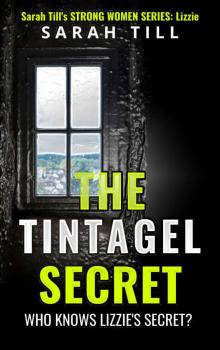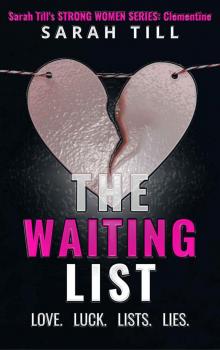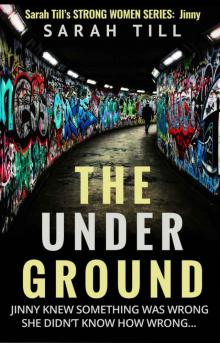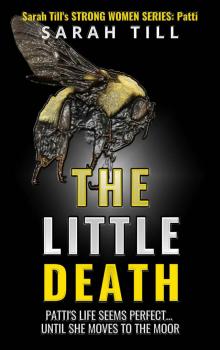- Home
- Sarah Till
The Under Ground (Strong Women Book 4) Page 2
The Under Ground (Strong Women Book 4) Read online
Page 2
“The truth is, El, that we will actually have some money coming our way. Mum and that John bloke signed a pre-nup or something, so I still get the house and the farm and whatever money she had.”
Ellis looked thoughtful.
“That’s confusing. You would have thought, after everything that happened, that she wouldn’t want you to have the money, that she would have married on purpose to stop you getting it.”
I nodded and smiled.
“That’s what you would expect. But don’t forget I told her that I didn’t want it. Anyway, she could have willed it away, to the kids or to Battersea Dogs’ home. This is the perfect revenge. A way she could get to me even after death. Making me have something I don’t want. I told her quite clearly that even if she did leave me everything, I would never be able to spend the money without her being in the background. She’s bloody done this on purpose.”
I sat for a while and tried to summon tears, or at least some sadness. My mother had died. My mother had been murdered. Perhaps going to see her would jog some emotion. I put my coat back on. Ellis, who had gone to make a sandwich, rattled kitchenware and swore.
“I’m going to the hospital. I suppose I have to show my face. I expect I will be arranging the funeral, making the necessary phone calls and so forth.”
Ellis reappeared and reminded me that his green eyes were so beautiful.
“Shall I come with you?”
“No. Thanks, but I think I should go alone.”
“Good!” he smiled. We both laughed and I left.
Balance
I had to take the tube to get to the railway station where I would get a train out of London and to the hospital. Our house is almost opposite Victoria Station, so central that we are practically a tourist attraction. I walked over to the tiled steps and my heels clicked down into the depths. I take the tube every day and it’s the time that I feel the safest. I love nothing more than to check my mobile phone and see the immortal words ‘emergency calls only’. I watch as people run down the escalators on my left and people rise over the horizon slowly on my right. I walk slowly along the corridors that try to smell like fresh washing and onto the humid platform. I know now where to stand to synchronise with the carriage doors when the train stops. It had been like a game for a while, now it’s just another fact of my life.
I stood on the platform and sniffed. The train arrived almost immediately and I stood at the end of the carriage. Everyone eyed each other suspiciously, but not suspiciously enough to make eye contact. Since the word ‘insurgent’ had joined our language and held hands with ‘terrorism’ and ‘suicide-bomber’, the London transport infrastructure had become a hotbed of paranoia, the general public trapped in a game of ring-a-roses. No one wanted to fall down, but we all had to get to work.
On a normal day, I would have stood with my back to the carriage, allowing my body to move with it, intentionally unaware of the fear around me. Today, as I felt the drama imbue my normality with a tinge of quirky awkwardness, I became a sponge to the undercurrent of mass hysteria.
On a normal day, this is the time when I would balance myself, when there would be no need for the terror of the potential underground tomb. I would be busy scaring myself to death with the mantra of my tortured existence: none of this matters.
Chapter Two
I arrived at the hospital at around two. The journey from my house to the outskirts of the town near to where my mother lived took an hour and forty-five minutes. I waited outside the hospital doors for a few minutes. Although I felt slightly conspicuous, I equally knew that people would merely think I was waiting for someone. A woman in a wheelchair sat beside me smoking a cigarette.
“Hope you don’t mind.”
Her voice reached me through the wisps of smoke and I looked down.
“No.”
I wanted to walk away and be alone. I didn’t want conversation. This just wasn’t my day.
“Only they won’t let us smoke in there.” Her thumb was gesturing behind her. I wondered for a moment who ‘they’ were, presumably the nurses. “Just had my legs done, I have. Arteriosclerosis. I’m only fifty-two.”
I stared down at the woman whose grey crown appeared to be dotted with flakes of dry skin. She tilted her face upwards and smiled. I saw that she had lost two teeth, one from the top and one from the bottom. I gasped as I considered her age. Fifty-two. I would have put her age at about sixty-five, maybe more. I caught sight of myself in the hospital plate glass. I could have easily been mistaken for her daughter.
“Is that due to smoking?”
My question lingered in the air like the stale smoke. The woman shrugged.
“Yep. Thirty a day, me, forty sometimes.”
I looked at her and no doubt my face posed the obvious question. She smiled even more widely, her yellow incisors two-toning with the brown molars. Instead of prolonging my irritation with her, I decided to go inside. I smiled at her and she took another drag of her cigarette and exhaled in my face. I sighed.
Today was just getting worse. Now I had to go to see my mother’s body. I could see what I was doing: I was sabotaging, again. Making reasons not to do something that I didn’t really want to. It was almost a full-time occupation. Listing responsibilities and expectations in the landscape of my mind then devising obstacles to prevent me from achieving them. In teenagers, this is called rebellion. In adults, it is sheer bloody mindedness. Or sticking up for yourself. Or sometimes freedom. In any case, I would have done almost anything to avoid having to walk through the hospital corridor to the morgue.
I did walk and I did arrive at the morgue, a separate building joined to the hospital by a glass bridge. I followed the signpost for ‘viewing lounge’ and crossed the bridge.
As I rounded the corner, I saw it. A small family group huddled together. I suddenly felt like I was intruding in a private moment, that I should turn and walk away. As I prepared to retrace my steps the group broke ranks. The four people stared hard at me. Swiss Steve’s eyes pierced me with the background message of, ‘you told me you would stay with me forever then you left me’. This varied each time we met between this, ‘I wanted to grow old with you’ and, ‘didn’t our life together mean anything?’
“Jinny, you finally got here. What kept you?”
Steve looked at the man I assumed was John Baxter and shook his head. Shiralee stood behind him, dressed from head to foot in black lace and Jupiter sat on a hospital chair, his back arched and his chin resting in his hands.
Shiralee and Jupiter: the products of my marriage to Swiss Steve. Swiss Steve was called Swiss Steve not because he was Swiss, but because he was a gangster. Because Steve was a popular name and in his ‘organisation’ there were four people called Steve. Each had been assigned a precursor to their actual name that was associated with banks. As well as Swiss Steve, there was Merchant Steve, Savings Steve and Giro Steve. Swiss Steve had been a bank robber. Quite big-time once but not anymore. Swiss Steve had made the mistake of getting caught. There had been a robbery and he was implicated in a gun crime. I was completely aware of what he did for work, but I never imagined that he could kill another human being. He told me he didn’t do it, but everyone knew he did. The problem was that there was no evidence and he completely got away with it. Apart from the haunted look in his eyes and the fact that it destroyed our marriage.
In the early days, Swiss Steve Munro was the boss. He got what he wanted. When our daughter was born, I told the nurses she would be called Lindsay Elizabeth. Swiss Steve crossed out the tiny girl’s name tag and wrote in big red letters ‘Shiralee’. When I protested, he shot me a warning look that, by that time, pierced my heart like a real bullet. I was already mortified by the fear of him and his bullying and petrified by his lifestyle. Our son followed swiftly afterwards and I didn’t even bother to name him. When I’d awoken in the morning after a difficult three a.m. birth, I checked the name tag. Jupiter. I rolled my eyes and watched the tiny baby boy wriggle and squirm.
I cast my eyes over Jupiter now. I had to suppress a smile as I thought of Ellis’ comment. When I told him about their names he thought for a while then screwed up his face.
“Jupiter, yes, it suits him actually. Big, full of gas and has lots of rings!”
We had laughed but I had to admit Jupiter was a little bit on the eccentric side. He was a cross between a punk and a hippy, if that style could exist. Ellis said that he wasn’t a hunk, so he must be a pippie. He wore his hair in a straggly mess of blue and red and blonde and wore black clothes with a cardigan. Lots of jewellery, particularly rings, hung from his lanky frame. Every day. This made his individualistic stance ironic, and we could never tell if this was a statement in itself or if he had just missed this point. I felt a pang of maternal instinct as I saw how unhappy he looked, and for a nanosecond I wanted to make it right. Comfort him, hold his hand, stroke his hair. He saw me staring and shifted his body away from my glare.
“Jinny, this is John Baxter, your mother’s husband.”
Swiss Steve smiled through the introduction but his tone betrayed his sarcasm. He may as well have finished the sentence the way he wanted to, with the words, ‘you know, the step-father you never met because you hated your mother’. John stepped forward and I shook his hand.
“Nice to meet you, John. Obviously not in these circumstances. I’m sorry for your loss.”
My words felt detached, as if I was sorry for his loss, but I had no idea what that loss was because I didn’t feel it myself.
“Thank you, Virginia. You mother spoke often of you.”
John’s voice was quiet and polite. His hand was warm and soft as I followed my line of vision up his arm and to his face. When DI Payne had told me that my mother had married a man called John Baxter, I had immediately thought of Baxter’s soup, and wholesome goodness. I had imagined him to be portly and bald, maybe a little older than my mother. Someone who could perhaps out-seriousness her and cajole her into trivial pursuits such as gardening and rambling. This man was not the man I imagined. He was quite handsome, tall and slim, with a steely but caring look in his red-rimmed eyes. I studied him for a moment. He seemed to be around the same age as me. I turned my head as the realisation hit me. Mum had married a younger man. I had looked at him for too long and, ever the jealous husband even though we had been divorced for years, Swiss Steve stepped between us.
“Shall we go through then?” he asked, pointing to the door.
I looked at Shiralee, who actually had a veil lowered over her face now and a black lace handkerchief ready to dab her eyes. Swiss Steve placed his hand on her lower back and they followed John and Jupiter through to the room where we would see my dead mother. I walked slowly behind, looking back to see if there was an escape route. I faced forward again and saw the door in front of me was open. Everyone else had gone in and only I stood outside. I suddenly felt afraid and chilled to the bone. As I sidled into the room, a wave of fear washed over me and then I saw her.
She lay in a glass container, just her head and hands visible. She was blonde now, not mousy brown like the last time I had seen her. A soft honey blonde, her hair was quite long and cut well. Her face looked thinner and somehow softer than the last time I had seen her. Her hands were folded over her stomach and she still wore the wedding ring Dad had given her, but on her right hand. On her wedding finger she wore a thin gold band and a small diamond engagement ring. Her nails were painted a soft pinky-purple. I had heard that people who went to see their relatives when they were dead describing them as looking like they were asleep. I hadn’t believed it, but, apart from a twist of pain around her mouth, she did look just like she was asleep.
On the surface, she had been an excellent mother. Complete with a wicker shopping basket, covered with gingham elasticated cloth, she had taken me to primary school and waved frantically as I skipped through the double doors hand in hand with Susan McGee. She would bake after school and my friends would visit for tiny tea parties. As an only child, my time alone was balanced with visits to Mum’s friends’ houses and time spent in the kitchen baking with her. I even had pony riding lessons. My childhood was idyllic and I cannot identify one glimmer of unpleasantness until I was nine. My beautiful, stylish mother and my handsome hard-working father were happy. Dad would often work away during the week, and we would welcome him back with open arms, with him thrusting gifts at us as we strolled through the garden and into the house.
One evening after I had gone to bed, I heard a faint rumbling of anger downstairs. It was the low thunder of my father’s voice and it made my stomach tense. In time, the piercing lightning strike of my mother’s insults could be heard, making me jump up and hide. The storm erupted into a hurricane and finally I heard a door slam. I had drifted off into a deep, unhappy sleep and for the first time in my life felt what I now recognise as uncertainty. I awoke in the morning with the seed of worry growing into a huge weed that would haunt my adolescence. The day was not new, and I saw that the sun was already flooding the garden with pale light. My school uniform lay at the end of my bed and the house was quiet. I grabbed Linda, my favourite doll, and marched down the hallway to my mother’s room. Her bed remained undisturbed and I went in search of her or Dad. A feeling of panic rose in my body as I saw that the lounge clock showed nine-thirty. I was late for school.
I turned and saw her. She lay on the sofa, an empty bottle of pills beside her. Her arms cradled a whiskey bottle, the contents of which she had vomited over the side of her face. I walked outside the house and around the corner to get Mrs Hall. She was in the kitchen baking and the familiar smell of Bakewell tarts hit my senses. She looked at me and no words were spoken. We ran to my home and she called for an ambulance. My mother was taken away and I went with her. For some reason that I cannot understand now, I was present when her stomach was pumped. It was as if I was invisible to her, to the doctors, to the nurses to everyone. My father arrived later to take me home, driving in silence the five miles from the hospital to home. From that day onwards, I remained invisible until the day my father died.
Shiralee sobbed loudly now and leaned over the glass case and Swiss Steve stood behind her. Jupiter looked at Granny and then left the room. John stood politely in the background, staring at the floor. After fifteen minutes, we all left. Walking back over the glass bridge, Jupiter slowed his lollopy pace to draw level with us.
“Will they take those rings off before they cremate her?”
His narrowed eyes found Shiralee’s gaze. She scowled and pushed back the veil.
“Yes, but you’re not having them. They’re mine. She said that they were mine when she died.”
“But, Mum.....”
I tried to ignore them best I could, but it was all becoming far too much for me.
“Shut up. Shut. Up. You’re like a pair of vultures. Look, your Gran paid for her funeral and all the proceedings before she died. I’m sure she will have left a will. We’ll have to wait and see, won’t we?”
Swiss Steve just shot me a, ‘knowing your luck you will get everything’ look. He had been sore when Kevin Jakowski had left me the house. A mere account executive at the time, I was the main benefactor of a man who had no family whatsoever. I had been to his house many times to consult with him when he was ill and too frail to come to the office to carry out his business. There had been no impropriety at all; he had been a gentleman. We had drunk tea and laughed at the ridiculous bylines the agency came up with for his company that sold condoms and I knew that he recognised another solitary soul. I think he saw it in my eyes, the sorrow I felt at the misunderstanding my life had turned into, the superficial way I put one foot in front of the next to get through the day. The way I had been sidelined, my intentions corrupted by other people’s opinions.
He had died in his armchair of what his death certificate described as respiratory disease at fifty-eight. In the reading of the will he had left his home to me. It was a beautiful six-bedroom detached house on the corner of Grosvenor
Gardens. It was mine for the duration of my life, then it was to be sold and the proceeds would go to a charity that researches a cure for cancer. The day we had moved in, when Shiralee had been thirteen, she had worked out that the money from Swiss Steve’s house where we’d lived previously would be frittered away. On holidays and school fees whilst this new house would never really be ours.
“What will you leave us then, Mummy? Like Mr Jakowski left you? You will have nothing to leave us, will you?”
Her big brown eyes had been solemn as I explained that money really wasn’t everything and that we were lucky to be able to live rent-free for the rest of my life. Shiralee thought for a while.
“So, you should really put away the rent money, you know, the money you would have bought a house with, and put it in the bank. When you die, me and Jupe would have it?”
I think even then she saw me as a huge currency sign, a symbol of what she could have, an ATM that spewed forth Barbie and Monsoon party dresses. Any attempts to partake in practical activities with her such as baking a cake or sewing a garment were scuppered. Swiss Steve’s production of a wad of cash and his silent, ‘why are you doing that when we can afford to buy it?‘ crossed with, ’you are a terrible mother’ look made sure of that.
It truly was the shape of things to come and I thought that it was about to culminate in a crescendo as her voice raised itself several octaves and began shrilling into a full-blown whine.

 The Tintagel Secret
The Tintagel Secret The Waiting List (Strong Women Book 5)
The Waiting List (Strong Women Book 5) The Under Ground (Strong Women Book 4)
The Under Ground (Strong Women Book 4) The Little Death
The Little Death